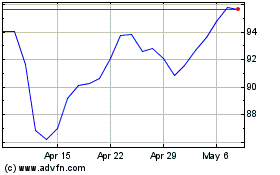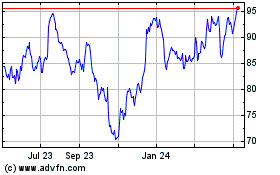As central banks run out of bonds to buy, they flood
corporations with cheap money
By Christopher Whittall
The European Central Bank's corporate-bond-buying program has
stirred so much action in credit markets that some investment banks
and companies are creating new debt especially for the central bank
to buy.
In two instances, the ECB has bought bonds directly from
European companies through so-called private placements, in which
debt is sold to a tight circle of buyers without the formality of a
wider auction.
It is a startling example of how banks and companies are quickly
adapting to the extremes of monetary policy in what is an already
unconventional age. In the past decade, wide-scale purchases of
government bonds -- a bid to lower the cost of borrowing in the
economy and persuade investors to take more risk -- have become
commonplace. Central banks more recently have moved to negative
interest rates, flipping on their head the ancient customs of money
lending. Now, they are all but inviting private actors to concoct
specific things for them to buy so they can continue pumping money
into the financial system.
The ECB doesn't directly instruct companies to create specific
bonds. But it makes plain that it is an eager purchaser, and it
lays out the specifics of its wish list. And the ECB isn't alone:
The Bank of Japan said late last year it would buy exchange-traded
funds comprising shares of companies that spend a growing amount on
"physical and human capital, " essentially steering fund managers
to make such ETFs available to buy.
The furious central-bank buying has been a relief to companies
and governments that can now borrow at rock-bottom interest rates.
But it has also spurred criticism that the extreme policies are
killing the returns available to other investors, such as pension
funds, and loading up the economy and financial system with
potentially overpriced debt.
The ECB was late to the central-bank party -- it began
quantitative easing only in 2015, years after the U.S., the U.K.
and Japan -- but it has embraced bond-buying with fervor. In March,
it boosted its purchases to EUR80 billion ($90.6 billion) a month
from EUR60 billion and surprised investors by saying it would soon
add corporate bonds to its shopping list.
It had already bought so many government bonds that it was
running out of things to purchase.
The ECB had bought more than EUR16 billion of corporate bonds as
of Aug. 12, according to the latest available data from the central
bank, after starting purchases in early June. The lion's share has
been already-issued bonds trading in secondary markets, but some
has come in new debt sales, according to the ECB.
And Morgan Stanley has arranged two private placements that have
been bought by the ECB, according to a Wall Street Journal analysis
of data from Dealogic and national central banks.
The ECB cited its website when asked to comment on the
corporate-bond-buying program. On Thursday, it updated information
on the site to clarify that the bank can participate in private
placements. The ECB isn't involved in defining the characteristics
of the bonds in these sales, a spokeswoman for the central bank
said.
Private placements are private debt sales not open to the
broader market, typically relying on a handful of investors that
want to buy a company's bonds.
For the company, such a sale allows it to raise cash quickly
without having to draft a bond prospectus. Investors, for their
part, are guaranteed to get a sizable chunk of the bonds they want
to buy without having to compete with the wider investment
community.
"Typically there won't be a prospectus, there won't be any
transparency, there won't be a press release. It's all done
discreetly," said Apostolos Gkoutzinis, head of European capital
markets at law firm Shearman & Sterling LLP.
The ECB executes bond purchases through the eurozone's national
central banks, which function like branches.
The Bank of Spain holds some of a EUR500 million private
placement issued by Spanish oil company Repsol SA on July 1, and
some of a EUR200 million deal from Spanish power utility Iberdrola
SA sold on June 10, two days after the ECB program got under
way.
Both deals were solely arranged by Morgan Stanley and are the
only private placements issued since the start of the ECB's
corporate buying program to have been bought by national central
banks, according to the Journal analysis. Morgan Stanley declined
to comment.
Iberdrola didn't respond to requests for comment. A spokesman
for Repsol said it makes sense for the company to lock in low
borrowing costs in bond markets. "It's all about bringing your
global interest payments as low as possible," the spokesman
said.
It is impossible to say exactly how much the ECB holds, because
the national central banks that make the purchases disclose only
which bonds they have bought, not the amounts. For almost the first
six weeks of the program they didn't give any details about which
bonds they had bought.
Still, the scant data are enough to make traders and strategists
scramble to divine what the big fish is buying. Guessing right can
pay off. Yields on corporate bonds have plunged in Europe. (Yields
fall when prices rise.) The average yield on euro investment-grade
corporate bonds is 0.65%, according to Barclays, compared with
0.99% before the program started and 1.28% before the bank said in
March that it would buy corporate bonds.
"We're all looking at the data," said the head of credit trading
at a major European bank. "They're only one new customer -- but
it's a big one."
And banks are rushing to serve it. Credit Suisse Group AG
reshuffled its sales coverage of national central banks in recent
weeks when the trading desk realized it wasn't doing enough
business with the new largest buyer in town, according to a person
familiar with the matter.
The ECB's corporate-bond program may well grow further. The bank
is widely expected to extend quantitative easing beyond March, when
it is planned to end. Government bonds are growing increasingly
scarce. The ECB can buy only bonds that yield more than its deposit
rate, currently minus-0.4%. That rules out vast amounts of German
government debt, and much else too.
More corporate bonds are one option, and the central bank could
buy a greater proportion directly from companies. The program has
only been operating in the summer, typically a slow season for bond
sales.
That means more opportunities for investors.
Credit strategists at Citigroup Inc. calculate that bonds
eligible for ECB purchases have outperformed ineligible bonds by
roughly 30% since the program was announced in March.
Tom Ross, a portfolio manager at Henderson Global Investors,
said he spends a good deal of time perusing a spreadsheet created
by his team to track and analyze ECB purchases.
"It has a number of implications," he said. The ECB owning a
bond "is almost like a backstop bid. It provides liquidity in a
time of stress."
--Tom Fairless contributed to this article.
Write to Christopher Whittall at
christopher.whittall@wsj.com
(END) Dow Jones Newswires
August 22, 2016 02:47 ET (06:47 GMT)
Copyright (c) 2016 Dow Jones & Company, Inc.
Morgan Stanley (NYSE:MS)
Historical Stock Chart
From Mar 2024 to Apr 2024

Morgan Stanley (NYSE:MS)
Historical Stock Chart
From Apr 2023 to Apr 2024
